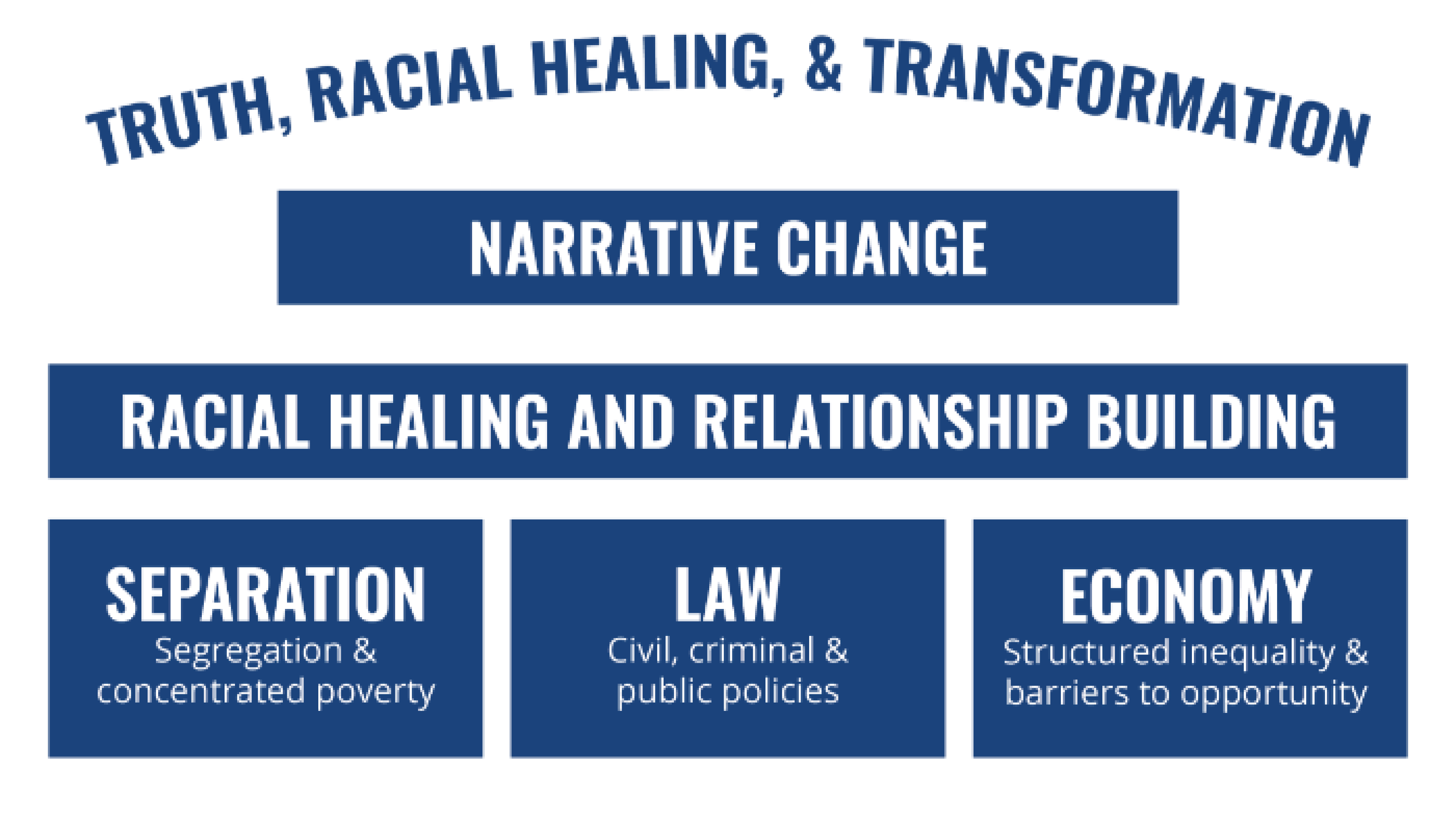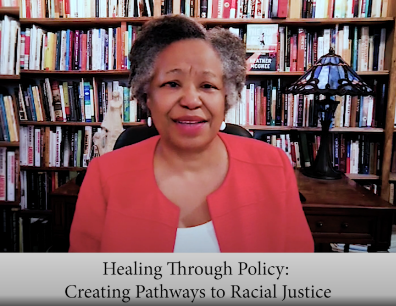By Gail C. Christopher
The National Collaborative for Health Equity (NCHE) has partnered with the American Public Health Association and the de Beaumont Foundation to launch an initiative that can be a difference-maker for communities seeking racial and health equity – “Healing through Policy: Creating Pathways to Racial Justice.” Following the brutal murder of George Floyd, like more than 20 million others, we too were inspired to protest and stand up, calling for racial justice now. Staff and advisors to our three organizations spent nine months after the tragedy scouring the country (virtually) and reviewing materials to find evidence-based policies and practices that can lead to sustainable transformations. Our initiative offers local leaders a suite of policies and practices that have demonstrated their effectiveness as they were implemented to help advance health, racial equity and justice.
Disseminating these important policies is helping city and county leaders address the racism that public officials increasingly acknowledge exists. As of fall 2021, more than 220 local jurisdictions declared that racism IS a public health crisis. Further, Dr. Rochelle P. Walensky, Director of the CDC, issued a powerful statement in April: “What we know is this: racism is a serious public health threat that directly affects the well-being of millions of Americans. As a result, it affects the health of our entire nation…”
This is a moment of unprecedented momentum for racial healing and redressing the protracted and cumulative harms from centuries of entrenched racial hierarchy. Working together, local jurisdictions, activists, public officials, community and civic leaders are boldly paving the way forward, creating pathways to overcome barriers erected by structural and systemic racism. Through its All-American City Awards, the National Civic League celebrates the best in American civic innovation by recognizing the work of communities in using inclusive civic engagement to address critical issues and create stronger connections among residents, businesses and nonprofit and government leaders. The Awards demonstrate the power of civic engagement and cross-sector coalitions as forces for change.
NCHE is proud to partner with the National Civic League in presenting a special issue of the National Civic Review adapted from the policy briefs that were the foundation for Healing Through Policy. The briefs derive from the Truth, Racial Healing and Transformation (TRHT) work started in 2016 by the W. K. Kellogg Foundation (WKKF). We engaged 176 civic leaders, scholars and practitioners to help design implementation strategy for the TRHT, which I envisioned while serving as a WKKF Senior Advisor and Vice President. TRHT helps communities embrace racial healing and uproot conscious and unconscious beliefs in the hierarchy of human value that fuels racism.
The TRHT framework empowers transformative approaches to community-based healing and supports the pursuit of actionable change. Narrative Change and Racial Healing and Relationship Building are the foundational pillars for all TRHT work, while the remaining three pillars address how America has sustained racial hierarchy for centuries and outline a path forward to jettison structural and systemic racism. These pillars are: Separation, the Law and Economy. The concept of narrative change, in particular, plays significant conscious and unconscious roles in shaping the perceptions and actions throughout our society.

The original TRHT Narrative Change Team offered an insightful summary of its importance:
 People are defined by unique stories, which are told through time by family, friends, teachers, and even those they barely know or view through a derogatory demographic lens. Stories are consistently told about each of us, ascribing a place in the world through perceptions and personal encounters. Just as important are the stories people tell about themselves, manifesting their own self-worth, as they attempt to carve a place in society.
People are defined by unique stories, which are told through time by family, friends, teachers, and even those they barely know or view through a derogatory demographic lens. Stories are consistently told about each of us, ascribing a place in the world through perceptions and personal encounters. Just as important are the stories people tell about themselves, manifesting their own self-worth, as they attempt to carve a place in society.
Collectively, these stories forge the prevailing narrative about individuals, the living map that travels with us throughout our daily activities – be it work, school or play. When a law enforcement officer pulls someone over for a “routine” traffic stop, the narrative he or she consciously or unconsciously believes about the driver largely determines whether a gun is drawn or the greeting is a friendly smile. Thus, it is the narrative, as the nation is learning, that has profound implications during an encounter with police, at a job interview, at the hospital emergency room, or during countless other interactions each day.
Narratives have the potential to accentuate, negate or perpetuate existing social biases, or make people more or less empathetic and generous. Thus, narrative change must be a critical component of America’s TRHT enterprise. TRHT is seeking to change the conditions for the development of both real, perceived and imagined stories, so that everyone can be exposed to full, complete and accurate representations of themselves and articulate the truth. Research shows that Americans are rarely exposed to full, complete and unvarnished truths about the lives of people of color. Instead, we are often distracted by misconceptions and stereotypes.
Here are brief introductions to other policy briefs being shared:
- Racial Healing & Relationship Building
The THRT framework defines “to heal” as to restore to wholeness, to repair damage, and to set right. Healing a societal racial divide requires acknowledging the wrongs of the past, while also addressing the consequences of those wrongs. Racial healing involves focusing on ways for all of us to heal from the wounds of the past, to build mutually respectful relationships across racial and ethnic lines that honor and value each person’s humanity, and to build trusting intergenerational and diverse community relationships that better reflect our common humanity. Racial healing is about building relationships, connecting people, and expanding the circles of engagement needed for overcoming racial hierarchy and building political will.
- Separation
The belief in a hierarchy of human value is sustained by keeping people apart. In cutting off Indigenous people from their rights to self-governance and controlling access to such basic resources as food and water, colonization is the original form of separation, and it serves to benefit white society. Within the TRHT Framework, separation is defined as the division of groups based on a particular characteristic, including race and/or socioeconomic status. It is fostered by historic and present-day land use and development decisions that perpetuate racial inequities, such as segregation, colonization, and isolation, which lead to concentrated poverty and limit access to opportunity.
- Economy
For centuries, people of color in the United States have been denied equal access to resources and opportunities. From the forcible displacement of Indigenous people, to the enslavement and exploitation of Black Americans, to the historic and present-day exclusion of immigrant groups and exploitation of people of color in the workforce, inequity is created and sustained in U.S. economic policies and practices.
We offer these briefs to amplify and accelerate the good news and hard work of countless innovators, activists and agents of positive social change across this country. We join them in demonstrating that meaningful and lasting change is not only possible, it is happening through policies and civic practices grounded in truth telling, healing divisions, accounting for, redressing and transforming systems of structural racial hierarchy and marginalization of diverse populations. This is the work of TRHT.
Nationally, Rep. Barbara Lee (D-California) and Sen. Cory Booker (D-New Jersey) introduced resolutions in the House and Senate calling for the nation’s first national TRHT Commission. It would examine the effects of slavery, institutional racism and discrimination against people of color, and how this history impacts laws and policies today. The resolution has support by more than 300 organizations.
As a nation, it is critically important that we acknowledge the inequities of the past, their persistence today, and then act earnestly to heal the wounds and move forward together. NCHE believes that a TRHT Commission can help jettison the hierarchy of human value and launch a new era where all human beings are valued and have a capacity to see ourselves in one another. That’s the America that so many of us want.
Gail Christopher, an award-winning social change agent with expertise in the social determinants of health and well-being and in related public policies, is Executive Director of the National Collaborative for Health Equity. While serving as Senior Advisor and Vice President at the W.K. Kellogg Foundation, she was the driving force behind the America Healing initiative and the Truth, Racial Healing and Transformation effort.



